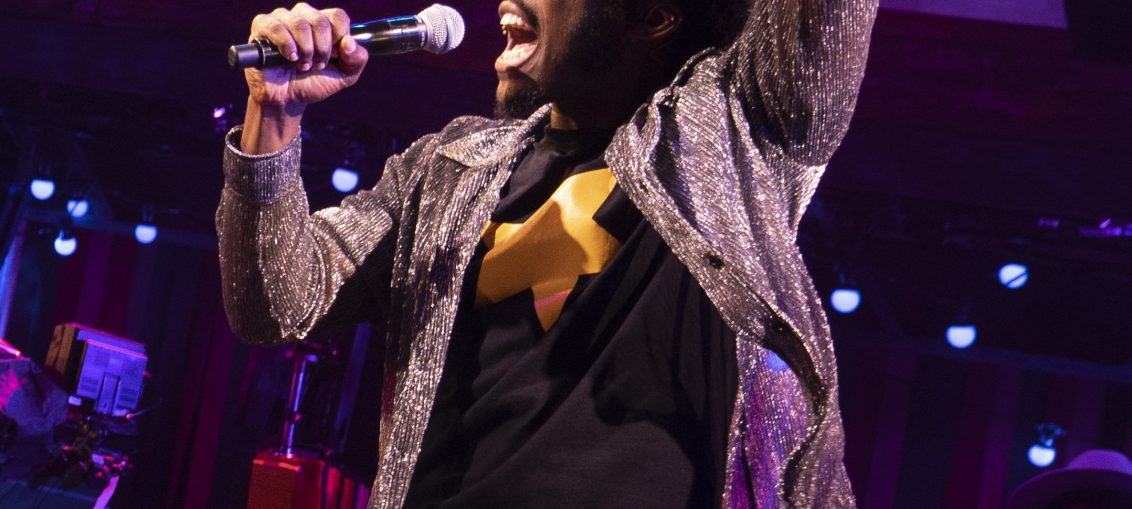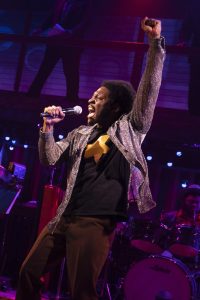

The Public Theater presents this stage version of the 1972 film by the same name. It was the first Jamaican feature film, just a decade after independence, and the first film that exposed a world-wide audience to reggae music. Jimmy Cliff played the lead role, Ivanhoe (Ivan) Martin, and for a time, he was the face of reggae before that passed to Bob Marley. While writer-in-residence Suzan-Lori Parker has altered some of the plot for instance, (larger parts for Ivan’s mother Daisy and his wife Elsa), she has retained the integrity of the story and theme.
“The Harder They Come” could be described as the typical story of a young man from the country who goes to the big city, struggles to find his way and becomes a corrupt outlaw because the streets were not paved with gold after all. That is perfectly accurate, but that would be a two-dimensional description of a four-dimenstional work that I want to see again.
As the show begins, we see Ivan (Natey Jones) arrive in Kingston to tell his mother, Daisy (Jeannette Bayardelle), that her mother (Ivan’s grandmother) has died and to give her some money. His real mission is to record a song and become a famous musician. Rather than get the night bus home as his mother advised, he stays and winds up penniless rather quickly. He finds his way to a church where he is exploited by Preacher (J. Bernard Calloway) and meets his future wife Elsa (Meecah). He records his song, only to find himself on the wrong-end of an unfair contract with Mr. Hilton (Ken Robinson) who seems to have the radio and clubs under his thumb
Desperate for funds, Ivan turns to the ganja trade via his friend Pedro (Jacob Ming-Trent). Soon, he discovers that the top man in the trade, Jose (Dominique Johnson), is cheating them. Moreover, Jose and the police are working together. Ivan buys a couple of guns, and a few more poor decisions have him on the run. It does not end well for him.
Because it is Ivan’s story, a great deal of the show rests on the shoulders of Jones, a job he manages with aplomb. He is likable, naive, charming and decent. He sings marvellously. The audience connects with this immediately, and that makes the whole show possible. But this is not a one-man play.
Bayardelle and Meecah take full advantage of their explanded roles to create the two main women in Ivan’s life. Both are fully developed characters in their own right, and make the stage play a more complete piece than the film.
On the male side, the same holds true. Calloway, Robinson, Ming-Trent and Johnson play their characters as fully developed human beings with their own stories, who just happen to have parts in Ivan’s.
Given the cast’s acting talents, this could work even without the music. But just as it was a lifetime ago, the music is the story – from Ivan’s desire to make a record to the songs themselves. Sometimes in a musical, an actor can carry a tune but cannot really make the impact needed in a show like this. That is far from the case here. The first time Meecah sings, there is a noticeable gasp from the audience; how can she be that good? When Bayardelle sings with her on “Please Tell Me Why,” the two create something special. Ming-Trent’s voice is showcased at the end, and it made me wonder if maybe that part could be expanded as well. The choreography, by Edgar Godineaux, blends wonderfully with the music.
As talented as the cast members are, the technical crew brought their “A” game as well. The set, designed by Clint Ramos and Diggle, looks and feels like Kingston in the 1970s (at least to someone who never experienced that first hand), and director Tony Taccone makes great use of the revolving sections of the stage. Of course, the sound design is exceedingly important here, and Walter Trarbach got the job done right.
I do have some trepidation about the show’s future, however. I worry that the usual suspects who buy theater tickets will not see the universal themes here, leaving in a niche position in the market. Outreach to a broader audience is needed, and that will cost money. The sudden and undeserved closing of “Ain’t No Mo’” is a cautionary tale. Expectations also matter here. “Hamilton” played at the Public before moving uptown to Broadway, and it may be too tempting to measure “The Harder They Come” against that standard.
Running Time: approximately 2 hours including a 15-minute intermission.
The Harder They Come is playing at the Public Theatre at 425 Lafayette Street through April 9, 2023.
 Saturday, July 12, 2025
Saturday, July 12, 2025